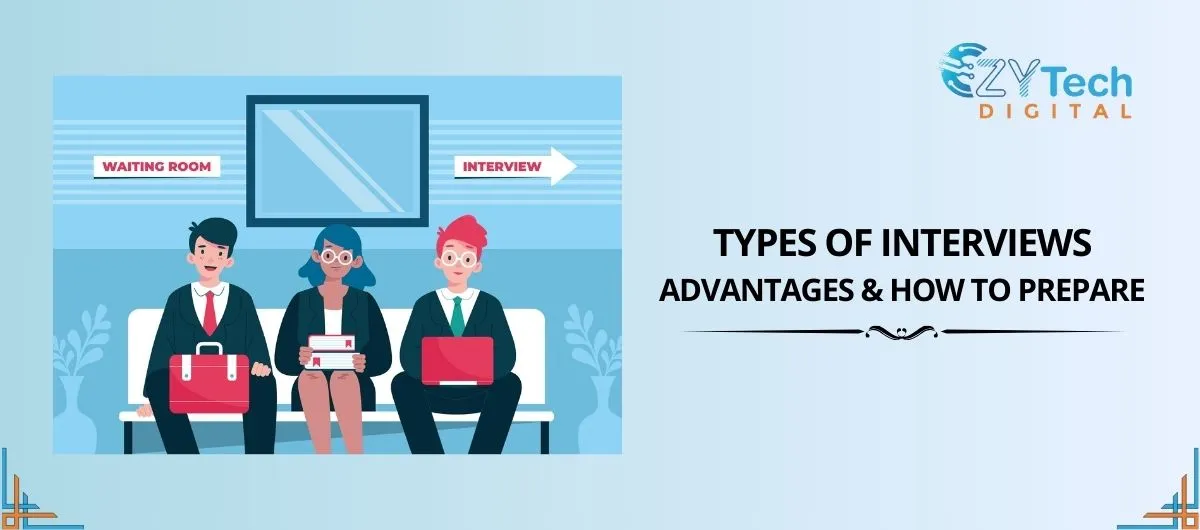
- April 3, 2025
- admin
- 0
As a job seeker, interviews can be nerve-wracking. The uncertainty, the pressure to make a great first impression, and the fear of the unknown can be overwhelming. One of the best ways to boost confidence and improve performance is to understand the different types of interviews and how to prepare for them. Since interviews don’t follow a one-size-fits-all format, knowing what to expect can give you a significant advantage. In this guide, we’ll explore the most common types of interviews and expert strategies for succeeding.
What is an Interview?
At its core, an interview is a structured conversation where an interviewer assesses a candidate’s suitability for a particular role, program, or opportunity. It is a two-way process where the interviewer gathers information about the candidate while the candidate also learns about the organization, role, or institution they are applying to.
Purpose of an Interview
Interviews serve multiple purposes, depending on the context in which they are conducted. Some of the key objectives include:
- Evaluating Skills and Qualifications: Employers use interviews to assess whether a candidate’s skills match the job requirements.
- Assessing Personality Traits: Interviews help gauge how well a person fits into a company’s culture or academic environment.
- Clarifying Details: Candidates get a chance to ask questions and understand their potential role or institution better.
- Making Informed Decisions: Both parties use the interview to determine if they are the right match for each other.
Meaning of ‘Interview’
The term ‘interview’ refers to a formal interaction between two or more individuals, where one party asks questions to gather relevant information. While most people associate interviews with job hunting, they are widely used in academic admissions, journalism, and research.
For example:
- Job Interviews: Employers assess potential employees.
- Academic Interviews: Universities evaluate applicants for admissions or scholarships. (Harvard Career Services)
- Journalistic Interviews: Reporters gather insights from sources.
- Research Interviews: Scientists and scholars collect data for studies.
Understanding the meaning of an interview allows you to approach different situations with the right mindset.
Contact us now for a free consultation!
Types of Interviews
Interviews come in different formats, each designed for specific purposes. Over the years, I have come across various types of interviews, and understanding them has helped me navigate my career more effectively. Here are the most common types:

1. Structured Interviews
A structured interview is like a well-organized exam. It follows a standardized format where every candidate is asked the same set of predetermined questions. The goal is to ensure fairness and consistency in evaluating candidates.
Characteristics:
- Pre-determined Questions: The interviewer sticks to a list of questions prepared in advance.
- Consistency: Every candidate is assessed based on the same criteria.
- Quantitative Analysis: Responses are often scored using a rating system to allow objective comparison.
Advantages:
Fairness: All candidates are judged equally, reducing bias.
Reliability: Since the format is standardized, results are consistent.
Disadvantages:
Rigidity: It doesn’t allow for much flexibility to explore unique aspects of a candidate’s personality.
Limited Soft-Skill Assessment: Structured interviews may not fully capture a candidate’s interpersonal abilities.
How to Prepare:
- Research common interview questions for your industry.
- Practice responses to ensure clarity and relevance.
- Align your answers with the job requirements to showcase your qualifications effectively.
2. Unstructured Interviews
Unlike structured interviews, unstructured interviews feel more like a natural conversation. The interviewer does not follow a strict set of questions, allowing for a more spontaneous and personal discussion.
Characteristics:
- Open-Ended Questions: The conversation flows based on the interviewer’s curiosity and your responses.
- Exploration of Personality: The focus is on understanding who you are beyond your resume.
- Subjective Evaluation: Decisions are based more on the interviewer’s judgment than on a structured scoring system.
Advantages:
Depth of Insight: Helps the interviewer gain a deeper understanding of your personality, motivations, and communication skills.
Flexibility: You have more room to express yourself naturally.
Disadvantages:
Inconsistency: The process varies from one candidate to another, making comparisons difficult.
Risk of Bias: Personal preferences of the interviewer may influence decisions.
How to Prepare:
- Reflect on your strengths, weaknesses, and career aspirations.
- Be ready to share personal stories that highlight your skills.
- Stay updated on industry trends and company culture.
3. Situational Interviews
A situational interview tests your ability to handle hypothetical workplace scenarios. Employers use this format to assess problem-solving and decision-making skills. This is one of the most commonly used types of interviews in various industries.
Characteristics:
- Hypothetical Scenarios: Candidates are presented with challenging workplace situations.
- Problem-Solving Focus: Employers assess how you approach and resolve issues.
- Real-World Relevance: Questions are based on actual job challenges.
Advantages:
Job Relevance: Provides insight into how you’d perform in real work situations.
Predictive Value: Employers can gauge your problem-solving abilities.
Disadvantages:
Limited Predictive Validity: Responses may not always reflect actual job performance.
Stress Factor: Thinking on the spot can be challenging.
How to Prepare:
- Review the job description to understand the key skills required.
- Practice answering hypothetical questions using logical problem-solving steps.
- Research industry-specific challenges to tailor your responses.

4. Behavioral Interviews
Behavioral interviews focus on past experiences to predict future job performance. The STAR (Situation, Task, Action, Result) method is commonly used. These types of interviews are widely used to assess candidates’ soft skills and cultural fit.
Characteristics:
- Experience-Based Questions: Expect questions about how you handled previous situations.
- Emphasis on Soft Skills: Assess qualities like teamwork, communication, and leadership.
- STAR Method: Responses should follow the STAR format for clarity.
Advantages:
Real-World Insights: Showcases actual experiences rather than hypothetical answers.
Predicts Cultural Fit: Employers assess if you align with their values.
Disadvantages:
Memory Recall Required: You need to remember and articulate past experiences effectively.
Doesn’t Always Predict Future Performance: Circumstances may change.
How to Prepare:
- Identify examples from past jobs that highlight key skills.
- Structure responses using the STAR method.
- Practice articulating experiences concisely.
5. Stress Interviews
Stress interviews test how candidates react under pressure by using aggressive questioning, rapid-fire queries, or even challenging behavior. This is one of the types of interviews designed for high-stakes roles where pressure management is crucial.
Characteristics:
- High-Pressure Tactics: The interviewer may be intentionally difficult.
- Tests Resilience: Observes how well you handle stress.
- Unconventional Format: Can involve puzzles, aggressive questioning, or controversial topics.
Advantages:
Tests Composure: This shows how well you handle stressful situations.
Simulates Job Challenges: Relevant for high-pressure roles.
Disadvantages:
Can Be Intimidating: Not suitable for all candidates.
Might Not Reflect True Abilities: Some great candidates may struggle in this setting.
How to Prepare:
- Stay calm and composed, even under pressure.
- Familiarize yourself with common stress interview tactics.
- Take a deep breath and maintain confidence.
Final Thoughts: Types of Interviews: Advantages & How to Prepare
Understanding the different types of interviews can significantly impact your confidence and performance. Each interview format serves a unique purpose, and preparation is the key to success. Whether you’re facing a structured, unstructured, behavioral, situational, or stress interview, knowing what to expect and how to respond will help you stand out from the competition.
Key Takeaways:
- Research and prepare based on the interview type.
- Practice structured responses for clarity.
- Highlight relevant skills and experiences.
- Stay confident and adaptable.
Remember, interviews are a two-way street. While the employer is assessing you, you should also evaluate whether the company fits your career goals. With the right preparation, you can turn any interview into a stepping stone to your dream job!
Did this guide help you? Share your interview experiences in the comments below!
Related: Executive Onboarding: Best Practice & Plan for Smooth Leadership
Frequently Asked Questions (FAQs) About Interviews
An interview allows employers to assess a candidate’s skills, experience, and personality to determine if they are a good fit for a role. It also gives candidates the opportunity to learn more about the company and the position.
Interviews often include commonly asked questions to assess a candidate’s suitability. Some of the most frequently asked questions include: Tell me about yourself, Why do you want this job?, What are your strengths and weaknesses?, Where do you see yourself in five years?, and Why should we hire you?
Interviewers often watch for signs that could indicate a poor fit for the role. Some common red flags include poor communication skills, lack of preparation, speaking negatively about previous employers, inconsistent answers, and unprofessional body language. Employers also notice if a candidate lacks enthusiasm for the job or company. To avoid raising red flags, ensure you research the company, prepare thoughtful answers, and maintain a professional and positive attitude throughout the interview.
Yes! Asking questions at the end of an interview shows your interest in the role and company. Good questions include: “Can you describe a typical day in this role?”, “What are the biggest challenges someone in this position might face?”, and “How do you define success in this role?” You can also ask about the next steps in the hiring process to show enthusiasm for moving forward.
In a group interview, multiple candidates are assessed together, or several interviewers question one candidate. To stand out, make sure you speak with confidence, engage actively, and listen attentively to others. Maintain eye contact with all interviewers, not just one person, and when participating in discussions, balance speaking and listening to show teamwork. If it’s a competitive group setting, avoid interrupting others and instead contribute meaningfully.
Speak With Expert
Fill The Form Below

